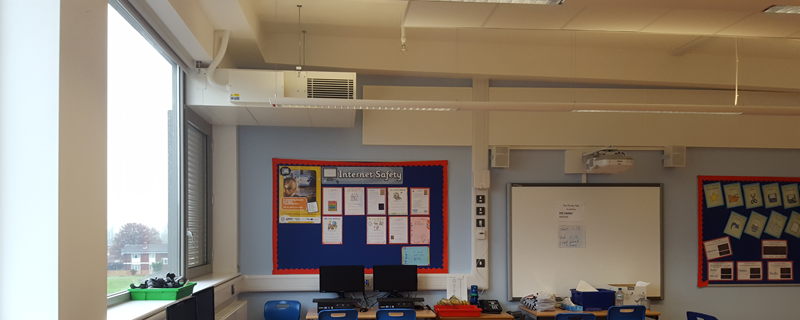Helping school design reduce carbon emissions
With heating being a school’s primary use of energy, leading independent building services specialist Gilberts is taking steps to help the educational estate optimise its carbon footprint.
The move coincides with updates to the required technical standards and performance criteria for schools’ mechanical services, within the Department for Education’s Facilities Output Specification(1). The updates are encouraging specifiers to consider utilisation of heat pumps as the most efficient way of warming, ventilating and cooling the building. When powered by electricity from a renewable source, with their high COP verses oil, gas or direct electrical options, heat pumps offer the school long-term benefits and lower energy bills.
However, it is important to ensure the heat pumps are installed with support building services systems that can work efficiently with them, so the school has a healthy internal environment for the pupils and staff.
Gilberts’ MFS hybrid ventilation units do just that.
Integrated into the heat pump system, Gilberts’ MFS can utilise the warmth brought into the school from the ground or air to maintain a comfortable internal environment in each individual classroom, year round, appropriately balancing warmth and ventilation as needed.
Typically, LTHW (low temperature hot water) is circulated around the school from system boilers at mean temperatures around 50-60°C. With heat pumps, the water is cooler at around 35°c for heating but there is also the option of 9°C for “free cooling”. Gilberts’ MFS has been designed such that these options can be used to heat the classroom during the cold weather or temper it during the warmer months.
Gilberts’ MFS hybrid, stand-alone ventilation system is recognised as being fully compliant with Environmental Funding Agency, Facilities Output Specification and BB101 requirements for school ventilation.
Strategically located at high level through the external façade, the unit efficiently ventilates each individual space with no need for ductwork, plant, fire dampers, associated penetrations into adjoining spaces (a growing consideration for schools to minimise Covid) and building work. The core MFS appliance provides natural ventilation and uniquely blends the incoming fresh air with the warmth from the exhaust air.
MFS can also be configured to run on 100% fresh air, using the coil to temper the air to provide Covid compliant ventilation without compromising the internal temperature.
Just 2 Mistrale MFS128’s or 1 MFS256 single-sided units will ventilate a standard 32 person classroom, achieving the 8 litres/sec/person fresh air required and within the particulant levels for Covid currently set by the Department of Education Building Bulletin (BB101) and PBSP guidelines. It brings compliant control over temperature, pollutants and CO2 levels and maintenance of a comfortable internal environment for occupants.
There is no need for radiators nor all their associated ancillary capital expenditure, installation, operating and maintenance cost. As the heat is supplied at high level, the risk of low surface temperature (LST) issues is also eliminated.
As a solus ventilation unit, MFS costs as little as £5/classroom/year(*) to operate. Using it as the means of classroom heating adds just £2.19/ classroom/year(*). Energy consumption and thus energy costs are reduced. Schools account for around 2% of UK greenhouse gas emissions, roughly the same as all the energy and transport emissions of Manchester, Newcastle and Bristol combined; this is equivalent to 15% of the country’s public sector emissions(2). Energy is also a school’s second biggest expenditure (after salaries) according to the Institute of School Business Learning(3): improving energy efficiency helps deliver best value against budgetary considerations.
Roy Jones, Technical Director @ Gilberts, observes, “Throughout our 60 year history, we have been at the forefront of innovative ways to make a positive difference to our use of energy while creating the best internal environment for building occupants. Evolving our MFS unit to include capability to work with heat pumps is a natural step on that path. It’s a win-win for any school in making a positive contribution towards reducing its carbon footprint.”
MFS is just part of Gilberts’ diverse range of ventilation systems, grilles, louvres and diffusers which, coupled with its in-house expertise, have established it as the leading independent supplier of air movement solutions in the UK. Family-owned, Gilberts is unique in the sector in its ability to design, engineer and supply its products with all processes undertaken in-house at its 85,000ft2 head office and manufacturing facility in Blackpool. Its Technical Director Roy Jones is also a member of TAPAS (Tackling air pollution at school).









Leave a Reply
Want to join the discussion?Feel free to contribute!